It’s funny – Superman’s the most iconic Super Hero comic book character, but until recently I barely knew more about him than the average person on the street that doesn’t (or never did) read comics. I knew he was raised by the Kents and I knew from the old cartoons and the Christopher Reeves movie that Lex Luthor was his enemy. I knew a little more because I had read The Death and Resurrection of Superman at a friend’s house in the nineties. But that’s about it. I knew way more about Batman. Because so many writers have a hard time writing for Superman he tends to be talked about as a loser. I Fight Dragons has the song “No One Likes Superman Anymore”. But as I got back into the comics scene over the past two years, people started to say that the average Superman story might not be anything to write home about, but there were some stories that any fan of comics should read – many of them standalone stories.
Past-Eric would have been against reading anything that didn’t contribute to the canon. A few things have changed me. First of all, within a few months of my return to comics in 2011 came the New 52 and the erasure of pretty much all DC canon. Then I learned this was something DC liked to do approximately once every 15-20 years. (For a new generation of fans, I guess?) Second, while there can be some pretty incredible stories told in the on-going format – Hickman’s run on Fantastic Four and FF or the Dark Phoenix Saga – I’ve come to realize there are some pretty strong limitations with the current model of comics. One of the best stories I read since getting back into comics was Rick Remender’s run on Uncanny X-Force which was able to be awesome because it was off in its own world. Other comics, like Wolverine and the X-Men get derailed for big events. And in on-goings we can’t have surprise or permanent death since the characters still need to be there for future exploitation. So I’ve started to really get an appetite for books with a defined ending like Chew, Multiple Warheads, Y; The Last Man, and many others. In short, I’m finally in a place where I can accept the idea of independent stories that just happen to feature characters we know and love – like Superman.
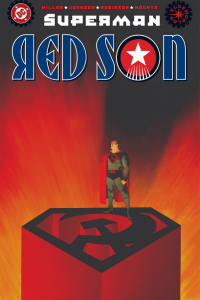
So I purchased Superman: Red Son, one of the oft-recommended stories. It is written by Mark Millar with Dave Johnson and Kilian Plunkett on pencils and Andrew Robinson and Walden Wong on inks.The artwork throughout this three issue mini-series is incredible. I especially love how issue number one, which takes place in the 1930s and 40s, emulates the art style of the original Action Comics. Mark Millar has fun with the concept right out of the gate. Those of us who grew up watching the old cartoons either on tape or when they first came out, knew that Superman was: “faster than a speeding bullet, more powerful than a locomotive, and able to leap tall buildings in a single bound” and “fought for Truth, Justice, and the American Way”. Milllar changes this to: “Strange visitor from another world who can change the course of mighty rivers, bend steel in his bare hands…and who as the champion of the common worker fights a never-ending battle for Stalin, Socialism, and the international expansion of the Warsaw Pact.” This is also an interesting place to remind readers that Superman ORIGINALLY stood for the working man as he was a socialist (in the European sense of the word, not the Communist sense of the word) hero. Action Comics #1 is a shocking read.
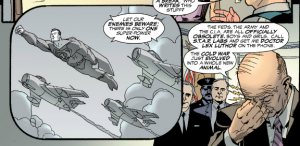
Even though the art style and tone of the story at the beginning of the first issue are deliberately set to emulate the look and feel of Action Comics #1, Millar, writting in 2003, is able to take advantage of the fact that comics can strike a more realistic tone. And so, the rise of a Soviet Superman ends up being the mirror image to America having Dr Manhattan in Alan Moore’s Watchmen. The United States immediately sees Superman as a threat. After all, they are powerless against what is essentially a god. And so, in due course, they appoint Lex Luthor to develop a counter to Superman. While there may be some continuity reboot versions of Lex Luthor that I don’t know about, it seems like this is the first time Lex Luthor isn’t presented as some sort of villain who hates Superman simply because he’s an obstacle to taking over the world. It’s neat to see Lex Luthor as a hero – after all, he’s trying to help the United States beat back a communist god. (Grant Morrison did something similar on his Action Comics Vol 2 run, but that was in 2011) It really frames the conflict between the two of them in a different light. Millar makes it even more complex by having Luthor actually still planning to rule the world, he just has to rid the world of Superman first.
One of the other interesting directions in which Millar takes the story is in having Superman’s internal conflicts between idealistic communism and communism as implemented in Soviet Russia. He’s still the Blue Boyscout because he was still raised by a Ma and Pa Kent equivalent. And the story takes place early enough in Soviet Russia’s history that the peasants would still have idealized communism rather than the jaded view they came to have. Because Superman rises to a position of power because of his powers and not through the usual system, he doesn’t experience the backstabbing and inequality that most of the humans do. When finally confronted with it he ends up taking the reigns of the Soviet Union to actually create the communist ideal.
In the second issue Superman is soon to be running the Soviet Union. Interestingly, as I was reading this story my dad told me about an interesting principle of human psychology. Sometimes a life-saving technology leads to more death because we get lulled into a false sense of security. Two examples my father gave were that we started driving faster after the advent of seatbelts which led to more dangerous crashes and we were more careless with our medicines after the childproof cap which led to more children dying of overdoses. Millar has the citizens of the USSR begin to act extremely recklessly as a consequence of having a living god in their presence. Why worry about falling off a building if you know Superman will catch you? Miller is not the first to deal with this – others have wondered whether a real life Superman would hold us back in comics before and since. A great example is in Irredeemable when it adds to the Plutonian’s neurosis when people begin to expect him to be able to save everyone and he goes off into space to not have to hear it all. The Plutonian also blows up at a guy who gets mad at him when the Plutonian saves the man from from death, but didn’t prevent his boat from getting damaged.
While it’s not original, it fits perfectly into the story I believe Millar is using as his template for this issue: The Garden of Eden and the Rejection of Heaven. Unlike some science fiction stories that present the illusion of paradise only to then reveal that everyone over 20 is killed or Soylent Green is people or something like that, Superman has truly created a paradise. Electricity and food are abundant. There is no crime. It is truly Heaven on Earth. And yet people revolt – they want the right to live in a messed up world. It really made the Bible story so much clearer – humans prefer free will to Paradise. And so the only true horror of Superman’s Soviet Union is that he lobotomizes his enemies. He’s only doing it to those who would ruin paradise, and again, it’s a true paradise – no hidden evils. But it parallels the argument that I learned in the Baptist Church I grew up in. God had to give us the choice of sinning because he loved us too much to have us lobotomized.
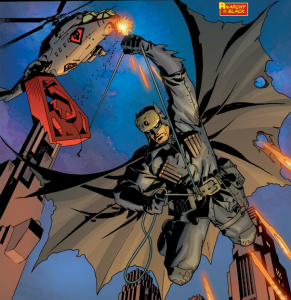
Batman works extremely well as the leader of those who want to overthrow Superman’s regime. His story of his family getting killed by the Soviet Government was a great motivator, but I think part of what made it so great was that there was finally a great reason for the Batman/Superman rivalry. It wasn’t immature like the New 52 fight. He works so great and his Soviet identity is so much fun that I would LOVE to see another Elseworlds book that would explore his Soviet Rogues gallery.
The most disappointing part of the story was that the mandate for the last issue seemed to be – “Don’t forget, Mark, you need to have Elseworlds versions of ALL the major DC heroes.” So we have a throwaway Green Lantern Corps as well as a couple other things that seemed they were included because they had to be. The ending was also quite unexpected. Superman appears to be defeated and Luthor takes over the world. However, he doesn’t end up with a villainous world. Instead he uses his intellect to create a scientific Golden Age. Of course, this leads to the other negative of a Paradise – without conflict humanity grows complacent. So when the Earth is about to be destroyed no one does anything. No one, but a scientist who endeavors to send his son back in time to save the world. That son is Superman and the story is revealed to be a causal time paradox story. It was fun, but I’ve grown quite weary of the time paradox.
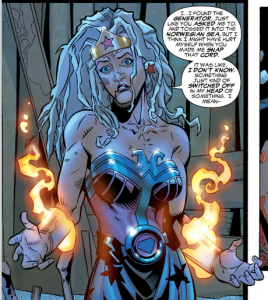
When I first read this story, I didn’t consider how gender factored into it. However, Christy Blanch’s Super MOOC has made me think about how gender issues were presented in this story. The principle females of the story, Lois Lane and Wonder Woman, don’t fare well, although I feel that Wonder Woman does better than Lois Lane. Lois Lane is in a marriage to Lex Luthor that’s so loveless it’s impossible to see what drove them together in the first place. It almost seems as though Lois is only there because she had to be part of the Elseworlds cavalcade and make the strange point that if Superman hadn’t been there, she would have ended up together with Luthor. While Lois has some bright spots near the end, she does nothing to help rid her of the stigma of just being there to pine for Superman. Wonder Woman gets Superman’s affections although Batman is able to turn her against Superman. Her main purpose in the narrative appears to be so that someone with god-like powers can fall for Superman and free him from Batman’s ingenious plot. It costs her her strength, beauty, and age and Superman doesn’t seem to properly repay her for it at all.
As a contrast to Superman: Red Son is Superman: Birthright. Birthright, written by Mark Waid, is a Superman that is not opposed to capitalism, but he isn’t exactly its champion either. Waid’s Superman is a return to Superman’s 1930s roots – socialism without communism. Birthright is a great example of how story telling has decompressed. Here is the whole of Superman’s origin in Action Comics Vol 1 #1:
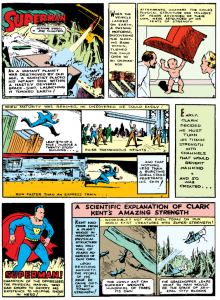
Yeah, besides not involving the Kents, it’s pretty quick before we get to the caped man. Mark Waid has us go through quite a few issues of Clark Kent’s socially conscious African reporting before we even get close to the super suit. I think this is also a great place to contrast the approach taken by Grant Morrison, who also took Superman back to his socialist roots. The Superman of Action Comics Vol 1 #1 may care about the common man (and hate wife beaters), but he’s also quite a jerk.
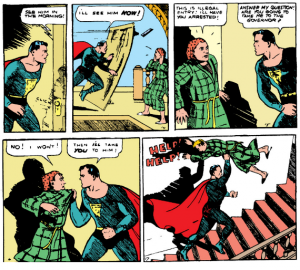
Gran Morrison takes the same approach to Superman and, as is his wont, seems to quote Siegel and Shuster:
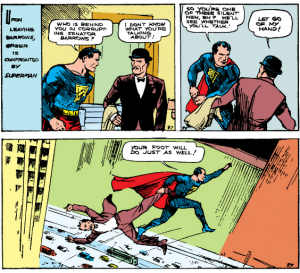
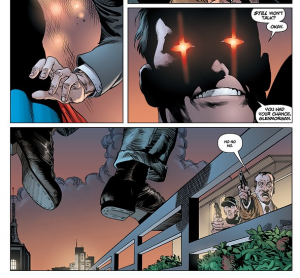
Mark Waid gives us a much kinder early Superman. Or rather he’s a lot more mature and less brash. As we discussed in the Super MOOC, Mark Waid gave Clark Kent/Superman more of a feminine slant as defined by popular culture in the 2000s. He’s a vegetarian (although it’s because he can sea life auras and it’s horrible when people die), for example. He also adopts such a weak persona (to throw people off from the fact that his only disguise is a pair of glasses) that he almost doesn’t get the job at The Daily Planet out of timidity. Lois Lane is also a much stronger character in Waid’s hands. Not only does she stand up to the owner of the newspaper repeatedly, but she puts herself in danger to get a news story. She is much more macho than the facade Clark Kent puts up in Metropolis. She is turned off at how cowardly he seems to be.
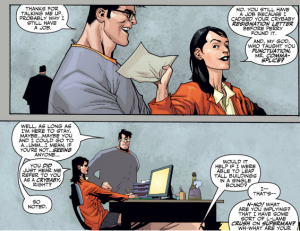
There was a bit of a discussion about whether this is undone by her sexual portrayal, such on on the cover of issue #4:
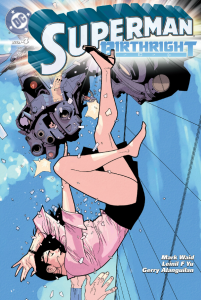
The comment was that she had these long, bare legs and she’s wearing a skirt that’s either torn or has a slit such that as she’s falling you can essentially see to the top of her thigh. (She’s either wearing very high cuts, a thong, or no underwear) Also she’s missing a shoe and if you don’t believe there’s a sensual dimension to the fact she was drawn that way, you need to watch Pulp Fiction. Personally, I think it’s a bit of a stretch. It may be saying a lot (or even the wrong thing), but Lois Lane is always dressed as a professional woman in the 2000s would dress and isn’t wearing skin-tight clothes like all the other women portrayed in comics. (And had this been a manga we would have surely gotten a panty shot) (Also, see the image from the above paragraph in which nothing about what she is wearing is conventionally sexy) So it just seems so petty to pick on this. Then again, I’m a man. Perhaps when you, as a woman, have to deal with the constant skin-tight suits and then you get a smart, powerful woman like Lois it hurts to see her like this? Personally, what I find more interesting about this cover is that she seems to have achieved a state of bliss. It’s as though she’s given up on life and wants to experience the fall with peace just as Superman is coming to stop her from splatting on the ground. Sexual exploitation notwithstanding, Leinil Francis Yu’s artwork in this series is gorgeous.
Again, on the positive gender role models side, it is Clark’s mom that is the technologically sophisticated one. While my mom is not as technological as Ma Kent, she came about it in the same way. She wants to research about aliens because of her son and that drives her to learn about the computer and Internet. My mom never did more than solitaire on computers until I went to college. Then she learned email and the Internet and now is one of the tech-saviest moms I know in that age group.
Superman has often been called, by comic historians, a Jewish Super Hero. And it was interesting that the way Waid (purposefully or not) wrote his relationship with Pa Kent seems to somewhat echo what it might have felt like for Joseph, the Virgin Mary’s husband as Jesus grew up – at least if it had happened in modern times. As Superman reaches for his god-like powers and tries to understand why his father sent him to Earth, his Earthly father experiences feelings of jealousy and rejection and acts out. And, in a scene that wouldn’t have been out of place in the Bible, Superman uses his super powers to shock his dad out of his anger and get a proper conversation out of him about how much he loves him as the father who raised him.
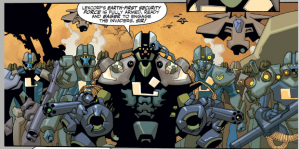
Every story (comic-based or not) is a product of its time and Superman: Birthright is at least partially a response to the world right after 11 Sept 2001. In an interesting parallel to Superman: Red Son, Lex Luthor appears to oppose Superman as a protector of the United States. However, unlike Red Son, he does not appear to have any good intentions whatsoever behind his actions. He’s able to use the fear of The Other to quickly get the populace against Superman. And, as has happened since 11 Sept, Waid has Luthor essentially gain the authority to use military force to protect the city against Superman. Luthor, of course, takes things further than any SWAT has in the real world, but there are still muted echos of that world in ours. While I don’t believe the 11 Sept conspiracy theorists, Waid gives them a nod as Luthor is actually running a false flag operation to make it seem that Superman was an advance scout for a Kryptonian invasion.
In a similar way to Red Son, Birthright is a character study of the antagonistic relationship between Luthor and Superman. Birthright is able to go much deeper because it’s not constrained by the world-building that the Elseworlds book has to do. And so we find out that what drives Luthor is that his high intellect and nerdiness have driven him to become the sociopath he is. In a way, it’s a look at what could have happened to Reed Richards without his friendship to Ben to ground him. Mark Waid tries the whole – Luthor’s bad because he had a bad childhood card. (He also has Pa Kent almost immediately dismiss it as hogwash) It ended up giving me more sympathy towards Luthor than I’ve had in any other medium, but just like Pa Kent I don’t believe it excuses his bad behavior as a teen or as an adult.
Waid also does a good job gender-wise in the flashback to Superman being sent to Earth. It is his mother who uses the strength of her mother’s love to convince his father to send him to Earth. (It could have easily gone the other way with her mother’s love making it so she didn’t want to part with him) They send him off without ever being able to know if he made it beacuse Earth is so far away. However, because of a plot device that Waid creates for Luthor to learn about Krypton, he’s able to communicate with them in the past. And so, the ending reveals that Clark is able to tell his parents that he made it. And it was one of the very, very few endings to anything (especially comics) where I almost teared up. I think it would have hit home no matter what, but it hit me especially hard because I’m a parent now.
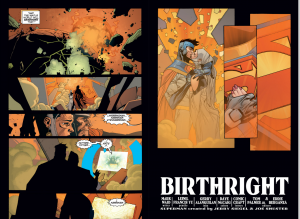
I think the most interesting thing about comparing these two very different, but very important, Superman stories we can arrive at the core of what makes Superman Superman. It is an unrelenting need to do good and help the people of his adopted planet. Whether working for America or Soviet Russia – he feels grateful to the species that took him in as one of their own and protects them with all his might. And that is the defining characteristic of Superman.
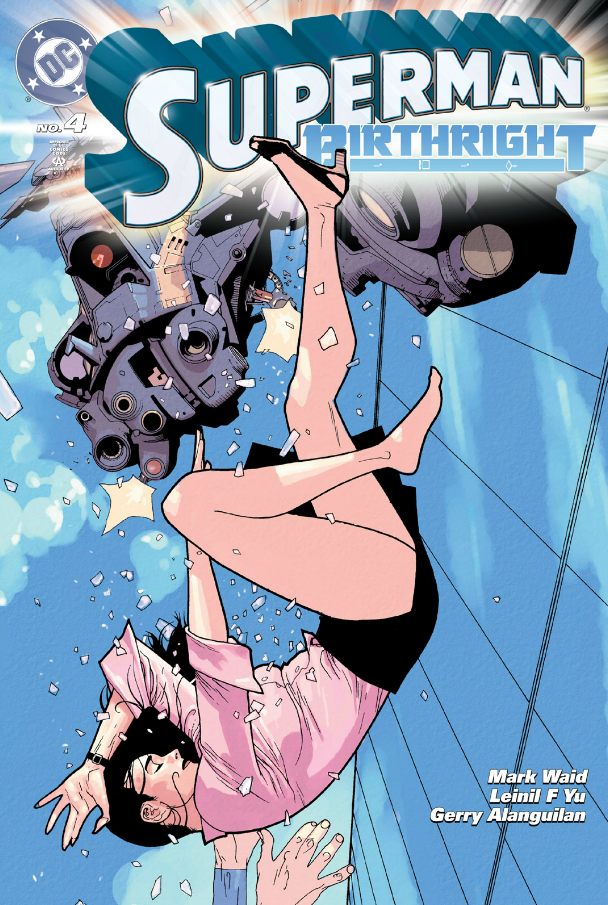
[…] or racist behavior, everything else can be seen as finding sexism where it isn’t really. (See my comment about how Lois Lane was drawn on the cover of Superman: Birthright for an example whe… – it’s about 3/4 of the way into the article) So it could be one of those things where […]
[…] should buy this week’s comics, but come here to have a deeper experience with those comics. (Here’s a great example of the type of article I’m talking about) We’ll also cover some comics news and previews, but it’s not going to be the main […]
Mark Millar’s always been known as a sexist, racist, frat-boy type writer and I’m not surprised that the women in his book are just decoration. I mean, the comic book versions of Wanted and Kick-Ass are just appallingly offensive…
I’m not surprised that you liked Waid’s more considering that you’ve had many chances to read his Superman-related work (I’m counting Irredeemable in this, since it pretty much is…). He’s definitely one of the greats.
[…] read somewhere (probably Rolling Stone) that this movie was loosely based on Mark Waid’s Superman: Birthright. Well, I’d have to put a STRONG emphasis on LOOSELY. A short list of differences: (note, […]
[…] not much harder to write a compelling origin story. Mark Waid’s Superman: Birthright, which I wrote about here, is a pretty good indication of what Superman’s appearance in our world might look like. […]